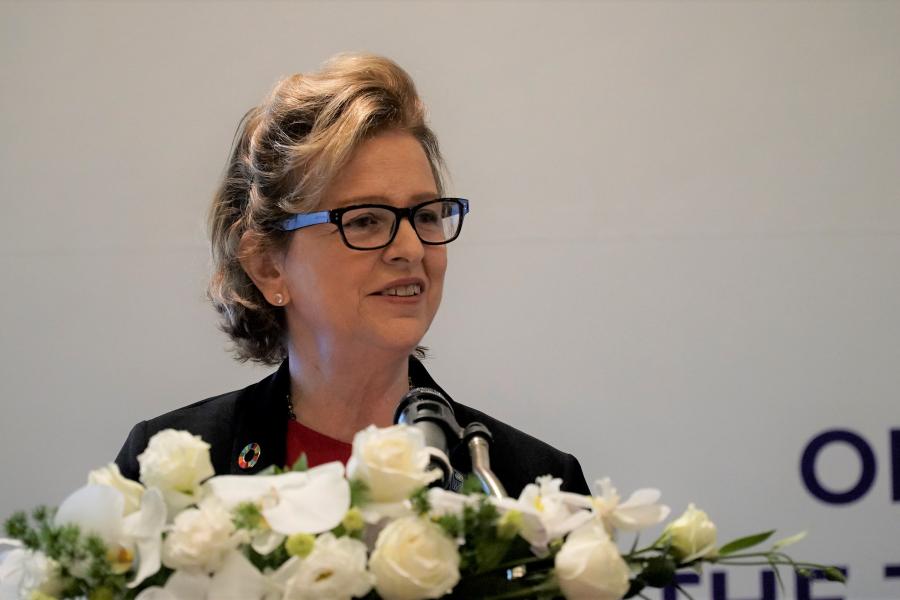Seminar introducing the National Master Plan for the implementation of Viet Nam's accepted UPR Third cycle recommendations
Opening remarks By Kamal Malhotra, United Nations Resident Coordinator in Viet Nam
(Delivered by Caitlin Wiesen, Chair, UN in Viet Nam’s Governance and Justice

Excellency Mr. Le Hoai Trung, Deputy Foreign Minister;
Excellency Mr. Do Hung Viet, Director General of the Department of International Organisations;
Colleagues from ministries and the United Nations Country Team;
Distinguished guests;
It is my great pleasure and honour to be here at this workshop today representing the UN Resident Coordinator. He would very much have liked to be here today but regrets that he is unable to participate in this important event. He has, however, provided his opening remarks given the national importance of the event, and has asked me to deliver these remarks on his behalf in my role as Chair of the UN in Vietnam’s Governance and Justice Results Group.
In early 2019, Viet Nam completed its Third Cycle Universal Periodic Review (or UPR). Since then, the Government has prepared a National Master Plan to implement the recommendations received by Vietnam. This workshop aims to introduce Viet Nam’s National Master Plan with all stakeholders who are and will play a key role in UPR implementation. Let me start by expressing my appreciation to MOFA for hosting this event. I would also like to extend my gratitude to UNDP for their extensive support in making this event happen.
The UN considers the UPR process to be an invaluable opportunity for the Government of Viet Nam to engage directly with all relevant stakeholders and receive guidance from other UN Members States. It is also an important occasion to reflect on Government policy and practice, and develop new measures, all with the objective of strengthening human rights protection in Viet Nam.
Over recent years, Viet Nam has made progress in human rights promotion and protection through the ratification of major international human rights treaties. This includes ratification of the Convention against Torture and the Convention on the Rights of Persons with Disabilities. Viet Nam has also made efforts to improve the domestic legal framework by revising the Criminal Code and the Criminal Procedure Code in 2015 to explicitly include some provisions that are more in line with international human rights law. These developments were recognized and welcomed by other States during the UPR.
During the 32nd session of the UPR Working Group held in January 2019, Viet Nam presented the National Report for the 3rd cycle and participated in a constructive dialogue with one hundred and twenty-two (122) UN Member States. Two hundred and ninety-one (291) recommendations were made, of which Viet Nam accepted two hundred and forty-one (241).
While the interactive dialogue between Member States in Geneva is always an important event, it is more crucial that this dialogue leads to the recommendations made being implemented. Looking back at Viet Nam’s 2nd UPR cycle, the 2015 National Master Plan played a key role in the implementation of the accepted recommendations. The National Master Plan for the 3rd UPR cycle was adopted in December 2019 with a similar objective – to set a path for the implementation of the accepted recommendations nationwide. For this Plan to succeed, each stakeholder must be aware of and fully understand the responsibilities vested in them. Today’s workshop provides that opportunity. All stakeholders will have the chance to discuss the Plan’s components and devise appropriate measures to address the priority areas identified in the Plan.
One priority area of the Master Plan, and also a central topic of today’s event, is human rights education and awareness-raising. Encouraging all individuals to understand and uphold their own rights, as well as those of others, is of fundamental importance because it contributes to the effective realization of all human rights. Given that at least 15 % of the accepted recommendations refer explicitly to human rights education and awareness-raising, special efforts need to be made to deliver results in this area. In addition to the Government, there are various actors within society, such as communities, civil society and the private sector, who have an important role to play in promoting and providing human rights education.
In the context of today’s workshop and this important process over the coming years, the UN in Vietnam would like to emphasise three key messages today.
First, human rights are fundamental to and inextricably linked to sustainable development. Implementing human rights commitments will also contribute to the realisation of the SDGs.
Second, all stakeholders play a vital role in the implementation of UPR recommendations in Viet Nam. International experience shows that public participation, including through a vibrant community of civic organizations, provides governments with crucial partners in giving voice to vulnerable groups, identifying risks or challenges, and finding solutions best suited to affected communities. We must all look to support this engagement and ensure that the full potential of Government engagement with the public is realized.
And last but not least, the international human rights framework including the UPR is intended to protect the most vulnerable, ensuring that no one is left behind. By supporting Viet Nam throughout the 3rd UPR cycle, the UN will continue to invest in strengthening our focus on “leaving no one behind.”
In conclusion, allow me to reiterate the UN Country Team’s commitment, as a longstanding partner of the people and Government of Viet Nam, to support the efforts of the Government in implementing the UPR Master Plan and, in so doing, to advancing the 2030 Agenda. We stand with the people of Vietnam in supporting the country’s continued engagement with this invaluable universal global mechanism to help protect, promote and fulfil the rights of everyone in Viet Nam.
Thank you (Xin Cảm Ơn)!


